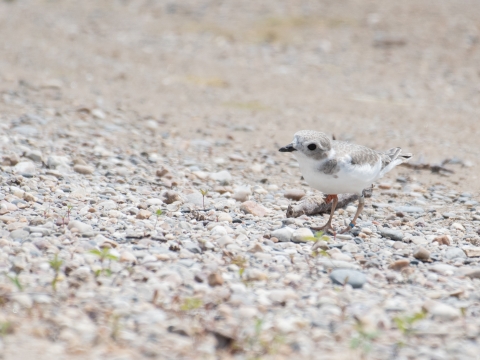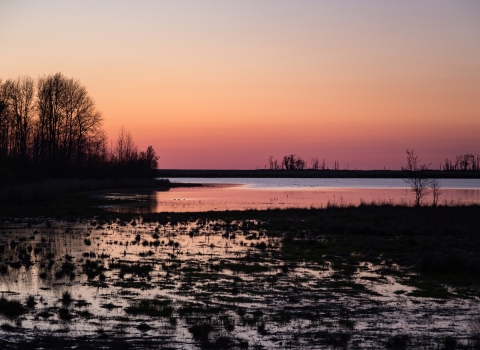We at the U.S. Fish and Wildlife Service, along with our partners the Illinois Department of Natural Resources and Sharing Our Shore-Waukegan, are celebrating the release of four piping plover chicks back into the wild at Illinois Beach State Park.
“Releasing captive-reared piping plover chicks in new locations helps to encourage the population to spread throughout the Great Lakes Region,” said Armand Cann, U.S. Fish and Wildlife Service fish and wildlife biologist. “It’s a strategy to reduce the extinction risk to the population. We aren’t putting ‘all our eggs in one basket’ or in this case all our chicks on one beach!”
“Illinois was selected as the first site outside Michigan for captive-reared chicks to be released because of our diverse shoreline habitat, the historic presence of plovers nesting in the area, and our unique ability to closely monitor released birds” said Brad Semel, Illinois Department of Natural Resources endangered species recovery specialist. “Everyone is excited because we have documented that captive-reared chicks are more likely to return to their release beach the next spring than wild-reared birds.”
At Illinois Beach State Park, these birds will enjoy the solitude of Illinois’ first dedicated nature preserve. Members of Sharing Our Shore – Waukegan, a partnership between the City of Waukegan and the Lake County Audubon Society, are working to monitor and protect the birds and inform the public about the unique Waukegan Dunes. Although the birds were released at Illinois Beach State Park, they are exploring their new home and moving between Illinois Beach and Waukegan Beach.
“Waukegan shares the honor with two other cities of being the first Bird City Illinois and its dedication to continuing improvements to maintain this designation are especially seen on work that is being done at the lake front,” said Glen Moss, president of Lake County Audubon Society. “The Monty and Rose story starts at Waukegan and began Lake County Audubon's collaboration with the city in educational public outreach programs. This newest release of plovers at Illinois Beach continues the story and brings new feelings of pride and dedication.”
The chicks have been named after native plants to honor the beauty and importance of the Great Lakes dunes. The names also reflect the endearing personalities of our Great Lakes piping plovers. The chicks are called Marram, for dune marram grass, Blaze, for rough blazing Star, pepper, for common pepper cress, and Sunny, for western sunflower.
“We are often asked how to help plovers,” Semel said. “Beaches managed for wildlife provide critical, dependable space for nesting, foraging, and for rest during the strenuous demands of migration. You can help wildlife by sharing the shore: respecting closed area boundaries, keeping dogs off the beach, and taking your trash with you at the end of your visit to prevent entanglement or ingestion.”
These 5-week-old chicks are well traveled. They were rescued in New York after each nest had lost an incubating adult. Federal, state and zoo staff helped to transport chicks to Michigan where they were raised in captivity at the University of Michigan’s Biological Station near Pellston, MI, where the Detroit Zoo manages a captive rearing facility for Great Lakes piping plovers. When the chicks gain sufficient weight and have honed their flight skills, their journey will continue south where they will search for protected beaches that can sustain them through the winter.
“Since the piping plovers nested in Waukegan in 2018, the city and Sharing Our Shore of Lake County Audubon have been preparing for the possibility of the return of these endangered birds,” said Moss. “Using both experienced and newly trained monitors, the chicks’ locations and behaviors have been carefully observed and recorded. We’ve noted the chicks are steadily improving their foraging and survival skills. Lake County Audubon is hoping for the chicks’ successful migration and return to Waukegan in spring 2024.”
In addition to Illinois Beach State Park, three young birds from New York were released at Montrose Beach in Chicago. Although they’ll start their life in the wild with a much different perspective of dunes and beaches, the chicks will find welcoming habitat at both sites for their return in the spring. These releases mark the first time piping plovers have been released outside Michigan and is a critical step toward the recovery goal of 50 breeding pairs outside of Michigan.
Piping plovers had disappeared from Illinois beaches around 1955. After population numbers started increasing, they were next seen nesting at Illinois Beach State Park in 2009. The adjoining Waukegan shoreline, once dominated by numerous industrial sites and factories, has shown the resiliency of nature.
“Management of the Waukegan dunes for its ecological diversity and shuttered factories restored to open spaces has enhanced the visual image of the lakeshore and resulted in growing ecological significance as nature returns,” says Semel.
“These chicks symbolize another step on the road to recovery for Great Lakes piping plovers,” said Cann. “This year marks the 50th anniversary of the Endangered Species Act. Without ESA protections we could have lost the piping plover. But today we are seeing a slow and steady increase in their numbers, especially with consistent funding from the Great Lake Restoration Initiatives which help our partners do such great work. I have hope for the future of this species.”
We thank our long term partnerships that have contributed to this milestone in species recovery, including the City of Waukegan, Sharing Our Shore - Waukegan of Lake County Audubon Society, Chicago Park District, Chicago Piping Plovers volunteer monitors, Illinois DNR, Detroit Zoo, University of Minnesota, National Park Service, US Forest Service, USDA Wildlife Services, US Environmental Protection Agency via the Great Lakes Restoration Initiative, Lake Superior State University, State University of New York ESF, Wisconsin DNR, Michigan DNR, Pennsylvania Game Commission and Department of Conservation and Natural Resources, Ohio DNR, New York State Department of Environmental Conservation, Canadian Wildlife Service and Ontario Ministry of Natural Resources and Forestry, Birds Canada, University of Michigan Biological Station, Great Lakes Tribes, Lincoln Park Zoo, Rosamond Gifford Zoo, Toledo Zoo, The Nature Conservancy, UP Land Conservancy, St. Louis River Alliance Audubon Society, Black Swamp Bird Observatory, Huron Pines, and all of the many volunteers throughout the Great Lakes!




